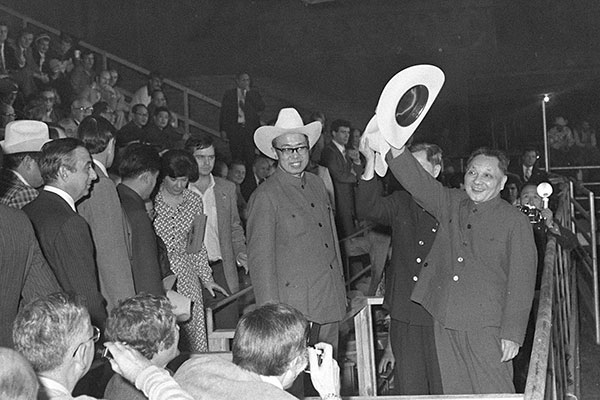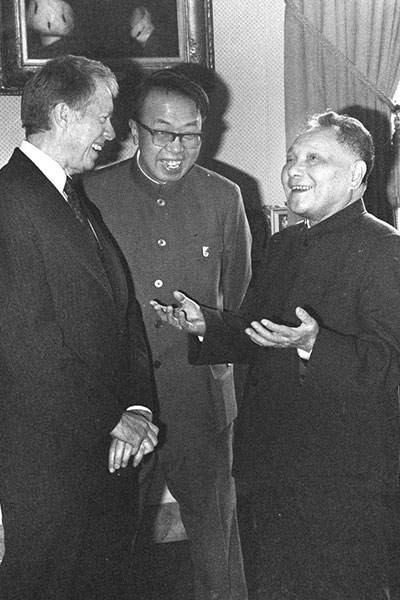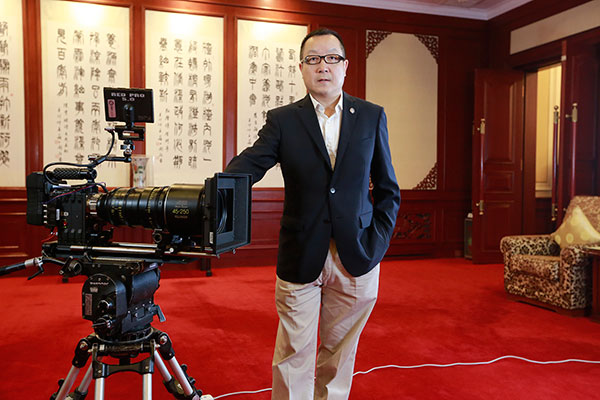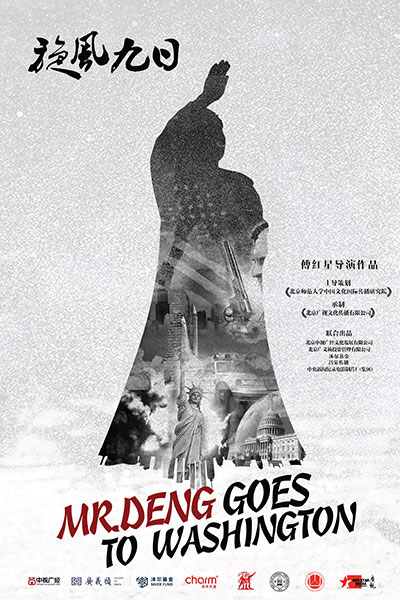
On Feb 2, 1979, Deng Xiaoping, then China’s vice-premier, interacts with Americans after watching a rodeo near Houston. [Photo/Xinhua]
Deng Xiaoping’s famous visit to the US in 1979 is captured in a new documentary arriving in theaters next year, Wang Kaihao reports.
For the first time, footage of an attempted assassination of China’s legendary late leader Deng Xiaoping by a Ku Klux Klan member while he was visiting the United States in 1979 will be shown in a new documentary scheduled to be released around the country next spring.
Production of the film, Mr. Deng Goes to Washington, wrapped up last week.
The film records the nine days beginning on Jan 29, 1979, when Deng (1904-97) made his historic visit to the US, only one month after the country established diplomatic relations with the People’s Republic of China.
Then China’s vice-premier, Deng went to Washington DC, Atlanta, Houston, and Seattle, and was the first Chinese state leader to land on the soil of this longtime adversary after the founding of New China in 1949.

Deng talks with then US President Jimmy Carter in the White House on Jan 29, 1979.[Photo/Xinhua]
A quick montage of historical video clips in the film’s trailer creates a tense atmosphere that makes the film seem more like a thriller than a documentary.
It is uncommon for Chinese documentaries to focus on state leaders - one reason that director Fu Hongxing labels it “a historical thriller”.

Fu Hongxing is famed for his documentary Zhou Enlai’s Diplomatic Career in 1998. [Photo/Provided to China Daily]
“Deng is a superhero and a big star who won for China the chances to develop in that complicated world,” the director says.
“The film, with a different storytelling method, will offer new acoustic and visual enjoyment for audiences who have a stereotype view against documentaries.”
Surprisingly, the trailer shows scenes of pro-Kuomintang protestors against Deng’s visit at the time, as well as footage of the attempted assassination,
Fu is famed for his Zhou Enlai’s Diplomatic Career in 1998. The documentary recording the former Chinese premier’s skills and devotion to the country’s international relations beat blockbusters to become that year’s highest grossing movie on the Chinese mainland.
Nevertheless, Fu made only 50 million yuan ($8.14 million) in ticket sales then. He was reluctant to predict the box-office performance of his latest work.

The poster for the documentary Mr. Deng Goes to Washington. [Photo/Xinhua]
Interviews are weaved into the film, and they include former US president Jimmy Carter and his national security adviser Zbigniew Brzezinski as well as other witnesses from both countries who participated in the visit.
“I was really cheered when President Carter told me that period of history was also appreciated by the American public,” Fu says.
“He also expected the film to be eventually screened in America.”
When the producers chose the current English title, which is a play on the 1939’s classical Hollywood drama Mr. Smith Goes to Washington, they may have a future American audience in mind.
Its original Chinese title is Xuan Feng Jiu Ri, which can roughly be translated as “nine days in a whirlwind”.
“The nine days were significant, informing the world of a new China and Chinese people’s strong wish to realize modernization,” says Gao Yi, head of executive office from the Party Literature Research Center of the CPC Central Committee.
“The visit opened the gate for our country, and greatly influenced the world order. The film will serve an important education function to encourage today’s audience to realize their dreams.”
Yu Minhong, the founder of the English-education colossus New Oriental Education and Technology Group, who was also interviewed for the film, is emotional recalling Deng, and says he will recommend the film to all his students and employees.
“If it were not for Deng’s visit establishing the bilateral relationship, English departments in Chinese universities would not have immediately increased their enrollment, and I would probably not have been able to become an English major at Peking University in 1980,” he says.
“Or, there would not be New Oriental.”
As the trailer says: “History is more wonderful than fiction.”
